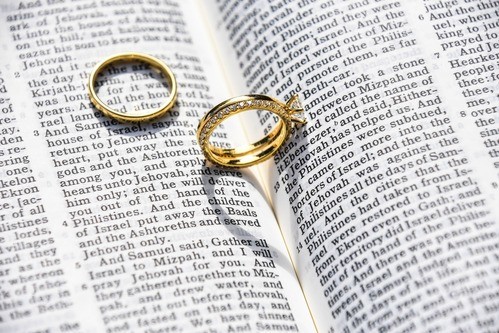December 4th, 2024
by KCW Blogger
by KCW Blogger
What is "Mainly for Men" all about?
This Blog explores what it means to be a "Man after God's own heart". Roger will share biblical verses and insights into how to become the husband, father, friend and productive creator you where made to be.
Finding a wife
In Proverbs 18:22 it is written: He who finds a wife finds what is good and receives favour from the Lord.
Happily married men tend to live longer than single men and have a reduced risk of cardiovascular diseases, type 2 diabetes and some forms of cancer. They also have a lower risk of depression and anxiety with lower feelings of loneliness. In short, they are happier and healthier. No argument with Proverbs.
But, marrying for romantic reasons is a relatively recent practice. At the time of Jesus and before, marriage amongst the Jewish people was arranged mainly for family or pragmatic considerations. The primary concern was the reputation, interests and compatibility of their families, rather than the feelings of the bride and groom. Men were also able to have multiple wives.
We shouldn’t forget the story of Jacob’s love for Rachel in Genesis 29:9-30. Her father Laban would only allow them to marry if Jacob had first married Leah his older daughter. The feelings of his daughters were discounted against him following the important rule of the older daughter needing to be married first.
In another Old Testament story, Ruth 3:1-18 and 4:1-13. Boaz married Ruth to fulfil a Levirate law which required a relative to marry a widow. After being approached by Ruth, Boaz a distant relative fulfilled his family’s responsibility and married her.
Throughout the ages royalty have used marriage for political ends to consolidate their power. In the Bible, King Solomon married numerous foreign women to establish political alliances and secure peace with neighbouring nations. These marriages led Solomon astray and into idolatry 1 Kings 11:1-4.
Happily married men tend to live longer than single men and have a reduced risk of cardiovascular diseases, type 2 diabetes and some forms of cancer. They also have a lower risk of depression and anxiety with lower feelings of loneliness. In short, they are happier and healthier. No argument with Proverbs.
But, marrying for romantic reasons is a relatively recent practice. At the time of Jesus and before, marriage amongst the Jewish people was arranged mainly for family or pragmatic considerations. The primary concern was the reputation, interests and compatibility of their families, rather than the feelings of the bride and groom. Men were also able to have multiple wives.
We shouldn’t forget the story of Jacob’s love for Rachel in Genesis 29:9-30. Her father Laban would only allow them to marry if Jacob had first married Leah his older daughter. The feelings of his daughters were discounted against him following the important rule of the older daughter needing to be married first.
In another Old Testament story, Ruth 3:1-18 and 4:1-13. Boaz married Ruth to fulfil a Levirate law which required a relative to marry a widow. After being approached by Ruth, Boaz a distant relative fulfilled his family’s responsibility and married her.
Throughout the ages royalty have used marriage for political ends to consolidate their power. In the Bible, King Solomon married numerous foreign women to establish political alliances and secure peace with neighbouring nations. These marriages led Solomon astray and into idolatry 1 Kings 11:1-4.

In Ancient Israel, whilst polygamy was tolerated, adultery was expressly forbidden by the Ten Commandments in Exodus 20:24. In the New Testament Paul states that a church leader must be faithful to his wife, with some translations saying his one wife. He set faithful monogamy as the standard for church leadership.
1 Timothy 3:2. Now the overseer (of the church) is to be above reproach, faithful to his (one) wife.
In the UK, historically marriages were always arranged by parents for their own reasons such as politics, land, wealth and social status. For the poor, to increase the chance that they and their children would survive meant many parents sought a fit and healthy mate for their children.
During the Reformation there was a renewed understanding that in God’s eyes, marriage was a spiritual partnership equal to the celibate lives of monks and nuns. Although families still had significant influence, it introduced the idea of personal consent in spouse selection but pragmatism remained a strong consideration. Marriage became a union in which love, respect, companionship and shared spiritual values increasingly began to be expected.
However, until the eighteenth or nineteenth centuries romantic love was generally not the reason for choosing a spouse. At this time people started to celebrate personal emotions and passions through romantic novels. Romantic love and personal happiness then began to be the main driving force in marrying someone as it is today.
For families with a South Asian or Middle Eastern heritage, arranged marriages are still usual and a matchmaker is often used for the initial selection. I have very limited knowledge of this custom. However, I know two couples, one from India and the other from Sri Lanka who have an arranged marriage. One couple being practising Christians. They both said that compatibility in family backgrounds was the most important point in their parents’ selection process. Both couples said that their courtship began after the marriage. Although love came slowly, it did come and all were very happy with the spouses their parents had chosen.
However, although in most families the parents want their children to be happy, with the best will in the world they cannot avoid being biased. There will always be a tendency to choose someone like themselves. Because I was so different to my wife’s parents, if arranged marriages were the norm here, it is extremely unlikely that they would have chosen me as their son-in-law.
The modern equivalent of a matchmaker is the highly sophisticated marriage/dating sites. At our last church there were three happily married couples who told me they had met through the same Christian site. One was a young couple, one was a widow and a divorcee and the other were both widowed.
As followers of Jesus, we are also able to obtain wisdom directly from God on any issue including love and marriage. The apostle James teaches us;
James 1:15. If any of you lacks wisdom, you should ask God, who gives generously to all without finding fault, and it will be given to you.
In 1967 whilst returning from working in Botswana, I remembered this verse and specifically asked God who I was to marry. Into my mind popped the name of a pretty girl I had met at church some eighteen months previous. So, for several mornings I made sure that I was driving past her house at the time she would be walking to school. I naturally offered her a lift and then another and then a date.
Unbeknown to me she had prayed that if it was God’s will that we should go out together, then the next time she saw me I would have shaved off my beard. For some reason that weekend I decided to remove my beard!
That was three children, six grandchildren and three children-in-law ago.
1 Timothy 3:2. Now the overseer (of the church) is to be above reproach, faithful to his (one) wife.
In the UK, historically marriages were always arranged by parents for their own reasons such as politics, land, wealth and social status. For the poor, to increase the chance that they and their children would survive meant many parents sought a fit and healthy mate for their children.
During the Reformation there was a renewed understanding that in God’s eyes, marriage was a spiritual partnership equal to the celibate lives of monks and nuns. Although families still had significant influence, it introduced the idea of personal consent in spouse selection but pragmatism remained a strong consideration. Marriage became a union in which love, respect, companionship and shared spiritual values increasingly began to be expected.
However, until the eighteenth or nineteenth centuries romantic love was generally not the reason for choosing a spouse. At this time people started to celebrate personal emotions and passions through romantic novels. Romantic love and personal happiness then began to be the main driving force in marrying someone as it is today.
For families with a South Asian or Middle Eastern heritage, arranged marriages are still usual and a matchmaker is often used for the initial selection. I have very limited knowledge of this custom. However, I know two couples, one from India and the other from Sri Lanka who have an arranged marriage. One couple being practising Christians. They both said that compatibility in family backgrounds was the most important point in their parents’ selection process. Both couples said that their courtship began after the marriage. Although love came slowly, it did come and all were very happy with the spouses their parents had chosen.
However, although in most families the parents want their children to be happy, with the best will in the world they cannot avoid being biased. There will always be a tendency to choose someone like themselves. Because I was so different to my wife’s parents, if arranged marriages were the norm here, it is extremely unlikely that they would have chosen me as their son-in-law.
The modern equivalent of a matchmaker is the highly sophisticated marriage/dating sites. At our last church there were three happily married couples who told me they had met through the same Christian site. One was a young couple, one was a widow and a divorcee and the other were both widowed.
As followers of Jesus, we are also able to obtain wisdom directly from God on any issue including love and marriage. The apostle James teaches us;
James 1:15. If any of you lacks wisdom, you should ask God, who gives generously to all without finding fault, and it will be given to you.
In 1967 whilst returning from working in Botswana, I remembered this verse and specifically asked God who I was to marry. Into my mind popped the name of a pretty girl I had met at church some eighteen months previous. So, for several mornings I made sure that I was driving past her house at the time she would be walking to school. I naturally offered her a lift and then another and then a date.
Unbeknown to me she had prayed that if it was God’s will that we should go out together, then the next time she saw me I would have shaved off my beard. For some reason that weekend I decided to remove my beard!
That was three children, six grandchildren and three children-in-law ago.

Recent
Archive
2026
February
March
2025
January
February
March
April
May
June
July
August
October
November
2024
September
October
November
Categories
Tags
1 Kings 11
1 Timothy 3:
2025
Advent
Alphabet
Amy Grant
Ancient Hebrew
Anointing
Baptism
Barbara Todd
Bathsheba
Ben Trigg
Births
Camp
Capernaum
Caroline D
Carol
Carpenter
Chris Eaton
Christmas
Creation
Dedication
Divorce
Elizabeth
Exodus 20
Family Worship
Fayre
Gabriel
Galatians 3:28
Galatians
Galilee
Genesis 1:27
Genesis 29
Genesis
God with us
Good News
Gospel
Graham Kendrick
Holiday
Hong Kongers
Ichthus
JesusCentred
John 11:32-38
John 11:41-44:4
John 12:12-19
Joseph
Journey
Kenya
Lars
Lazarus
Lebanon
Lent 2026
Luke 1-2
Luke 1:19
Lunar New Year
Magi
Manna
Marriage
Mary and Joseph
Mary
Matthew 19:4
Matthew 1:18-25
Matthew 27:45-46
Matthew 28 1:7
Matthew 28:1-7
Matthew 2:
Matthew 5
Matthew
Mike Burn
Missiom
Mission
Nativity
Nepal
Open Air
Outreach
Poem
Prayer
Promises
Prophecy
Revelation
Revive
Rib
Rising Generation Music
Ruth
Sandra
Shan
Shepherds
Song
Sunday Highlight
Testmony
The Call of Christ
The Coming
Vietnam
Wokingham May Fayre
Word of God
adv
incarnation
kimg
mystery
three kings

No Comments